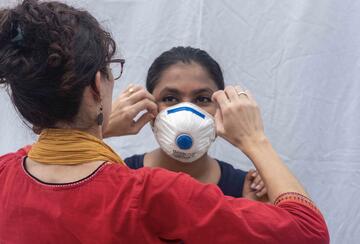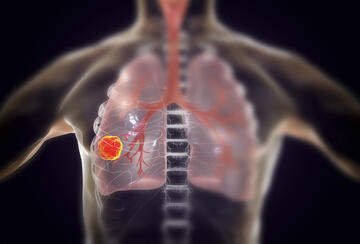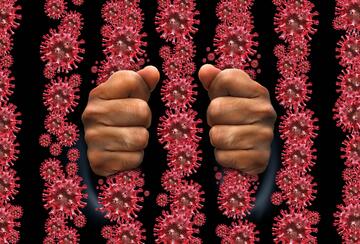The coronavirus pandemic is exacerbating domestic violence, particularly among low-income families. Research by Maya Rossin-Slater finds that babies born to mothers who experience an assault during pregnancy are more likely to weigh much less and be born prematurely — resulting in long-term deficits in health and well-being.

The U.S. Supreme Court has interpreted the 8th Amendment of the Constitution, which prohibits cruel and unusual punishment, to guarantee prisoners a minimum basic level of health care. Yet even though prisons are the epicenter of the hepatitis C epidemic, only a small minority of prisoners have gained access to new "miracle" drugs to treat HCV.

Stanford postdoc Ashley Styczynski and collaborators build a website devoted to protecting health-care workers in under-resourced countries, using infographics and videos to show them how to create, wear and preserve personal protective equipment.
While there is no national, cohesive COVID-19 contact tracing plan, SHP's Joshua Salomon writes that it's important to continue to invest in contact tracing capacity now, because once we can get a handle on the virus, the combination of testing, contact tracing and supported isolation will be essential to the containment and outbreak response.
“We’ve never been closer to each other or to those we serve," says Health Policy PhD candidate Suhani Jalota, founder of the Myna Mahila Foundation, a Mumbai-based women’s health and employment nonprofit. Its mission is to create the next generation of women leaders in urban slum communities — but COVID-19 isn't making it easy.
SHP's Jason Wang and School of Medicine student Henry Bair suggest schools should and can reopen safely if they follow a set of strict — though expensive — guidelines to avoid COVID-19 infections among students and teachers.
SHP's Michelle Mello writes in this commentary in JAMA Network that the attacks on and harassment of public health officials for taking steps to protect their communities from COVID-19 is extraordinary in its scope and nature, use of social media — and poses a danger to the ongoing pandemic response.

Many jurisdictions have responded to the unevenness of the COVID-19 pandemic by battening down their borders. SHP's David Studdert and Michelle Mello take a deep dive into the legalities of attempting to prevent people from crossing state lines in this New England Journal of Medicine perspective.
The CDC called on the National Academies of Sciences, Engineering and Medicine to develop a set of national, evidence-based guidelines for public health emergency preparedness and response. The recommendations are in.

Millions of Children at Risk of Measles as Vaccination Campaigns Take Back Seat to COVID-19
SHP's Eran Bendavid Warns that millions of young children around the world are at risk of missing their measles vaccines as health-care workers focus on COVID-19.
A team of Stanford researchers is working with the State of California on a new COVID-19 assessment tool to help hospitals and public health officials in their pandemic preparedness planning.

More women and African Americans would be prompted by their clinicians to get screened for lung cancer under a new recommendation by the U.S. Preventive Services Task Force.
Reopening colleges and universities during the COVID-10 pandemic poses a special challenge worldwide. Taiwan is one of the few countries where schools are functioning normally. In an Annals of Internal Medicine study, Jason Wang looks at what they've done in Taiwan and whether those actions could be applied here.
Sherri Rose comes to us from Harvard Medical School, where she co-founded the Health Policy Data Science lab.
SHP's Michelle Mello and colleagues note in this New England Journal of Medicine perspective that even when we have a clinically safe and successful vaccine against SARS-CoV-2 — only half of Americans plan to get vaccinated. Should the vaccine be mandated?
Michelle Mello, a professor of medicine and law, examines the reasons behind California's spike in COVID-19 cases and what can be done to bend the curve of the pandemic.
A $1 million gift from the Horowitz Family Foundation allows Stanford researchers to work on reducing the spread of COVID-19 among the incarcerated and inform mitigation strategies in other high-density living situations.

Several myths cloud public understanding of the connection between guns and suicide. Perhaps the most pernicious is the idea that people who really want to end their lives will find a way to do it, making the presence or absence of a gun somewhat irrelevant. Decades of research on suicide tell a different story.

Men who own handguns are eight times more likely to die of suicide by handgun than men who don’t have one — and women who own handguns are 35 times more likely than women who don’t, according to startling new research led by SHP's David Studdert.

SHP's Jason Wang and colleagues provide five key steps to managing infections in hospitals during the COVID-19 pandemic in this Journal of Hospital Medicine study, drawing on lessons from previous hospital-based coronavirus infections.

Stanford Health Policy’s Jason Wang and colleagues will ask volunteers to fly to Taiwan to test whether quarantine periods might safely be shortened — and help travelers become less wary of taking to the skies.
Disabled patients must not be categorically excluded from access to treatment during a pandemic or at any other time of national emergency, writes Stanford Health Policy's Michelle Mello in the New England Journal of Medicine.



















